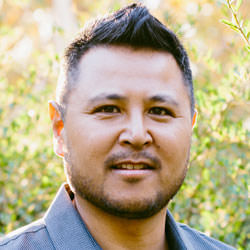
I had heard the story a thousand times. As a young man in China in the 1920s, my Gung-Gung (grandfather) Calvin Chao contracted the deadly disease of tuberculosis. Presbyterian missionaries Sophie and James Graham nursed him back to health in their living room over the course of many months and saved his life. In loving remembrance, my grandparents named two of their children after the Grahams. Through the extravagant love and biblical hospitality shown him by the Graham family, my Gung-Gung came to know the love of Christ and was later used by God to found International Fellowship of Evangelical Students (InterVarsity) in China. He also authored influential Chinese-language theological texts and hymns, founded several seminaries in Southeast Asia and the United States, and was dubbed “the Billy Graham of China” by “Christianity Today” magazine.
Nearly 70 years later, I had the privilege of meeting the Grahams’ great grandson, Dan Reid, at the Latino/a Consultation at InterVarsity Press in Chicago. Ironically, this gathering had nothing directly to do with China, Asia, or the Asian American community — I was invited because of my multiracial connections to the world of Latinx ministry and theology. We didn’t plan this reunion and hadn’t known each other before. As far as I know, our two families had not interacted for several decades.
Following our profound reunion, I went back to my hotel room in awe. I thought to myself, “Were it not for the love of Dan’s great-grandparents, I literally would not exist. What is God trying to tell me?”
Through prayerful reflection upon this experience, I have come to understand the biblical principle of “migration as grace”. A broad review of Scripture reveals that God uses the migration process as a source of grace both to migrants and their host countries. Here, I define “grace” not in its limited sense of forgiveness, as important as that may be, but in its broader biblical usage as God’s unmerited favor. So, to restate the previous principle in light of this definition: Migration is a source of God’s unmerited favor to both immigrants and their host countries.
In my grandfather’s case, God used the migration process to send a missionary family to China, save his life, and tangibly demonstrate Christ’s love and grace. Two decades later, the Reid family, together with other Christians from the United States, would lobby Congress to pass a bill that allowed my Gung-Gung, my Po-Po (grandmother), and their eight children to come to the U.S. as refugees, despite the existing ban on Asian immigration. The Reids understood that God’s moral law of hospitality preempted the Asian exclusion laws of the time, so they fought for the Chao family to receive refugee status after their lives were threatened by the newly installed communist regime. After migrating to the United States in 1955, my Gung-Gung and Po-Po went on to share the love of Christ with thousands of overseas Chinese graduate students, plant churches, write books, and sponsor the immigration of young pastors who would go on to found denominations such as the Evangelical Formosan Church and the Mandarin Chinese Baptist Church. Migration as grace. In and through all of these events, God used the migration process to extend God’s love, care, and kingdom throughout China, Asia, and the United States.

Many biblical narratives bear out this spiritual principle of migration as grace. The call of Abraham is one primary example. God effected the salvation of the world through Abraham’s obedience in emigrating from Ur. Through Abraham’s faithful act of migration and the process that this set in motion, all the peoples of earth have been, and are being, blessed by him.
The Lord had said to Abram, “Go from your country, your people, and your father’s household to the land I will show you. I will make you into a great nation, and I will bless you; I will make your name great, and you will be a blessing. I will bless those who bless you, and whoever curses you I will curse; and all peoples on earth will be blessed through you” (Gen 12:1–3 NIV).
The patriarch Joseph offers another example of God using migration, in this case a forced migrant, as a source of grace for many. Joseph was slave-trafficked to Egypt by his jealous brothers, and through a series of divine interventions, rose to the rank of second in Egypt. Through this position, Joseph saved his whole family, Egypt, and Canaan from famine. Joseph stated as much to his brothers in Genesis 50, saying, “You intended to harm me, but God intended it for good to accomplish what is now being done, the saving of many lives” (Gen 50:20 NIV).
The Scriptures also indicate that God provides for the food and other basic needs of immigrants when host countries are faithful to notions of biblical hospitality. In Genesis 12:10, Abram fled to Egypt to find food and escape famine. In Exodus 2, Moses found refuge for 40 years in the land of Midian and the household of Reuel. In the book of Ruth, we are told that Elimelek and Naomi sought relief from famine in the country of Moab. Subsequently, Ruth emigrated from Moab with Naomi to Bethlehem in search of food and in the process became a mother of the Jewish faith. And, of course, Jesus’ own flight to Egypt as a child refugee stands out as perhaps the most profound biblical example of migration as grace (Matt 2:13-15).
As much as the Bible uplifts the spiritual principle of migration as grace, it also offers counterexamples in which migration is treated as “ungrace” and condemned by the Scriptural record. The Exodus narrative is particularly illustrative in this regard. Xenophobia in a time of war led the king of Egypt to cruelly enslave the Israelites and relegate them to forced labor (Exod 1:9-11). When the strategy of oppressive labor proved ineffective to subdue the imagined political threat of the Israelites, Pharaoh then turned to the even more insidious policy of male infanticide (Exod 1:12, 15-16). As a consequence of its oppression of the Israelite community, Egypt experienced divine judgment in the form of the 10 plagues and the miraculous military defeat in the Red Sea (Exod 10:7; 14:27-28). As reflected in the Exodus account, the Bible clearly condemns the abuse of immigrant populations. God takes it seriously when host countries exploit immigrant communities and treat them with “ungrace”.
In this historic moment, my heart is grieved because many of my Chinese American Christian sisters and brothers have forgotten this biblical message of “migration as grace”. We have forgotten that we, too, not long ago, were “foreigners in Egypt” (Deut 10:19; Exod 23:9) — indeed, that many of us still are. We forget that we were the first ethnic group to be singled out for exclusion by the United States in 1882, and that the earliest “walls” were built to keep us out. As reflected in the following prayer of San Francisco pastor Isaac Kalloch in July 4, 1878, we were also the first targets of white Christian ethnic nationalism:
“We believe, O Lord, that the foundations of our government were laid by Thine own hand; that all the steps and stages of our progress have been under Thy watch and ward ... We meet together today to celebrate the anniversary of our national birth, and we pray that we may be enabled to carry out the divine principles, which inspired our noble sires and others, and we pray that our rules may be righteous; that our people may be peaceable; that capital may respect the rights of labor, and that labor may honor capital; that the Chinese must go … and good men stay. We believe Thou wilt hear our prayer when we pray that we believe to be right.”
Will the Chinese American church model migration as grace to the thousands of Central American families currently fleeing violence and poverty? Will we see in them the infant Jesus, and offer to them the same hospitality that saved the life of the Holy Family, as well as my own? Will we remember that we, too, were once “slaves in Egypt”, exploited for our cheap labor, and extend God’s grace to the millions of undocumented immigrants — Latinx and Asian — who have similarly contributed in vital ways to the United States’ economy? Or, will we model Pharaoh and perpetuate the same white racist nationalism that excluded and denigrated us for three quarters of a century? The choice is ours.

Robert Chao Romero has been a professor of Chicana/o Studies and Asian American Studies at UCLA since 2005. He is also a pastor, and together with his wife Erica, serves as co-chair of the Matthew 25 Movement in Southern California. Robert received his Ph.D. from UCLA in history and his J.D. from UC Berkeley. His first book,The Chinese in Mexico, 1882-1940, received the Latina/o Studies Section Book Award from the Latin American Studies Association. His forthcoming book is entitled, The Brown Church: Towards a Latina/o Christian Social Justice History and Identity (Intervarsity Press Academic, 2020).

Ivan Blanco is a Filipino American, Los Angeles-based illustrator and designer. He loves listening to people’s unique stories and telling his own through his work. He aims to use art as a platform to hear, share, and honor all stories especially ones that feel untold. See more of his work at ivanblancoart.com or through Instagram @ivanb511.